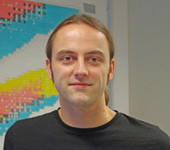Press Archive 2014
Our division member Dr. Robert Wolf has been selected to receive the
Wolfgang-Paul-Dissertation-Prize 2014. The German Society for Mass Spectrometry (DGMS ![]() )
is presenting every year the Wolfgang-Paul-Prize for Student Research
)
is presenting every year the Wolfgang-Paul-Prize for Student Research ![]() to the best
Diploma resp. Master and PhD theses in the field of mass spectrometry. Dr. Robert Wolf
is awarded one of the two Wolfgang-Paul-Dissertation-Prizes 2014 for his
doctoral thesis, which he wrote in the year 2013 within the
working group of Prof. Dr. Lutz Schweikhard
to the best
Diploma resp. Master and PhD theses in the field of mass spectrometry. Dr. Robert Wolf
is awarded one of the two Wolfgang-Paul-Dissertation-Prizes 2014 for his
doctoral thesis, which he wrote in the year 2013 within the
working group of Prof. Dr. Lutz Schweikhard ![]() at the Institute of Physics of the
University of Greifswald, Germany.
at the Institute of Physics of the
University of Greifswald, Germany.
Dr. Wolf also receives the "GENCO Award" of the
GSI Exotic Nuclei Community ![]() .
With this prize outstanding theses in nuclear physics are honored.
.
With this prize outstanding theses in nuclear physics are honored.
The main focus of his PhD thesis ![]() titled
"First on-line applications of a
multi-reflection time-of-flight mass separator at ISOLTRAP and the mass measurement of
82Zn" is the development and implementation of a mass separator based
on the time-of-flight method for the suppression of isobaric contaminant ions at the
on-line Penning-trap mass spectrometer ISOLTRAP
titled
"First on-line applications of a
multi-reflection time-of-flight mass separator at ISOLTRAP and the mass measurement of
82Zn" is the development and implementation of a mass separator based
on the time-of-flight method for the suppression of isobaric contaminant ions at the
on-line Penning-trap mass spectrometer ISOLTRAP ![]() at CERN.
The so-called "isobar separator" allows to trap charged particles by the use
of electrostatic fields and to achieve a high mass resolving power in the order of
100,000 in just a few milliseconds flight time. This technique enables to remove
isobaric contaminations from an ion beam and therefore was a crucial step for the
first mass measurement of the short-lived nuclide 82Zn. The nuclide was postulated by
different mass models to be a constituent of the outer crust of neutron stars, which
could be disproved by the mass measurement. Furthermore, this type of device has been
used as a mass spectrometer of its own on short-lived nuclides for the first time and
enabled the first mass measurements of 53Ca and 54Ca which proved
a neutron magic number at N=32.
at CERN.
The so-called "isobar separator" allows to trap charged particles by the use
of electrostatic fields and to achieve a high mass resolving power in the order of
100,000 in just a few milliseconds flight time. This technique enables to remove
isobaric contaminations from an ion beam and therefore was a crucial step for the
first mass measurement of the short-lived nuclide 82Zn. The nuclide was postulated by
different mass models to be a constituent of the outer crust of neutron stars, which
could be disproved by the mass measurement. Furthermore, this type of device has been
used as a mass spectrometer of its own on short-lived nuclides for the first time and
enabled the first mass measurements of 53Ca and 54Ca which proved
a neutron magic number at N=32.
Dr. Robert Wolf studied Physics at the Ernst-Moritz-Arndt-University Greifswald from 2003 to 2008 where he also finished his Diploma thesis on a multi-reflection time-of-flight mass separator test setup which he then moved to CERN. Currently, he works in the group of Prof. Blaum to set up a Penning trap experiment for g-factor measurements of hydrogen-like heavy ions.
Dr. Robert Wolf will be awarded the Wolfgang-Paul-Dissertation-Prize,
which is endowed with 5.000 Euro, during a ceremony at the
47th annual meeting of the German Society for Mass Spectrometry ![]() on March 3, 2014, in Frankfurt am Main, Germany.
The award honours Prof. Dr. Wolfgang Paul who received the Nobel prize in Physics in 1989
for the development of the ion trap technique (shared with Hans Dehmelt).
Prof. Paul was the third president of the Alexander von Humboldt Foundation (1979-1989).
on March 3, 2014, in Frankfurt am Main, Germany.
The award honours Prof. Dr. Wolfgang Paul who received the Nobel prize in Physics in 1989
for the development of the ion trap technique (shared with Hans Dehmelt).
Prof. Paul was the third president of the Alexander von Humboldt Foundation (1979-1989).
The prize ceremony of the GENCO Award will take place on March 6, 2014
during the NUSTAR Annual Meeting 2014 ![]() at GSI Darmstadt, Germany.
at GSI Darmstadt, Germany.
We cordially congratulate Dr. Robert Wolf on receiving this distinctions of his scientific work.
Further information:




